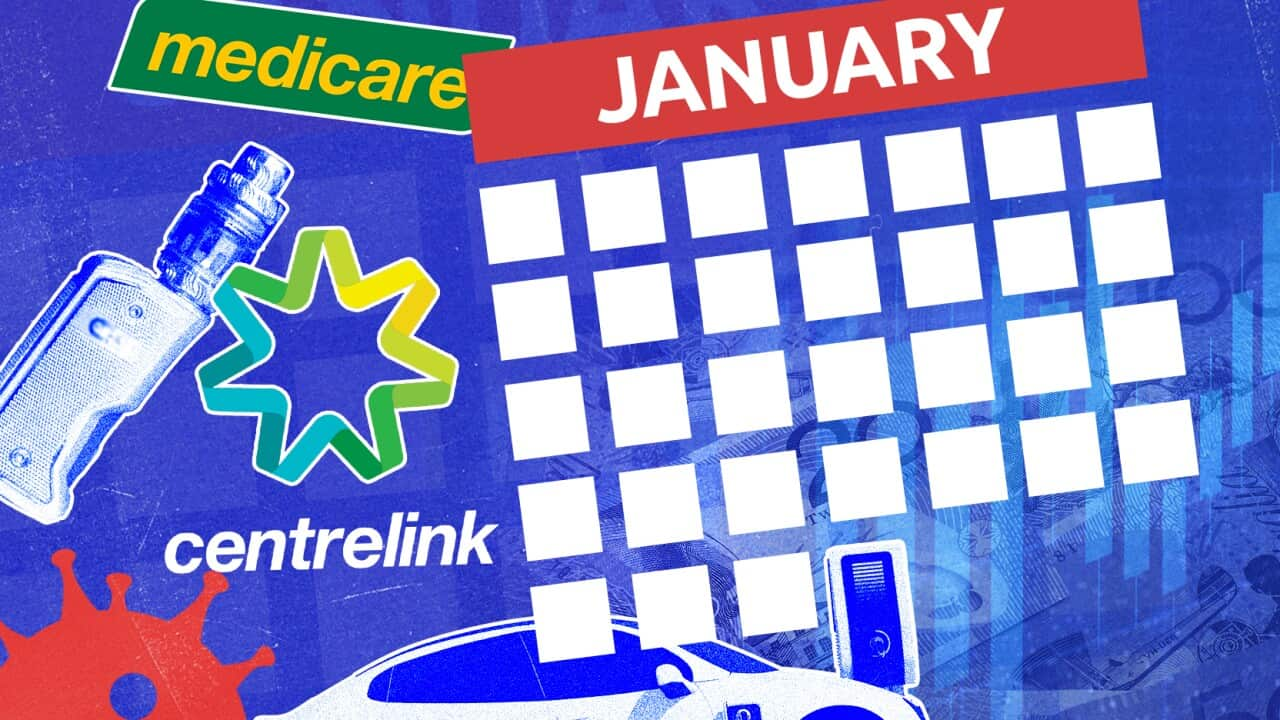The new year is here, bringing with it a range of changes.
From money matters to education, vaping, and electric vehicles, here's what you need to know.
Welfare payments
About 936,000 Australians receiving youth, student, or carer support payments will get a 6 per cent indexation increase.
Maximum payment rates depend on an individual's circumstances. Youth Allowance recipients will see increases between $22.40 and $45.60 a fortnight; those on Austudy between $36.20 and $45.60, and Disability Support Pension recipients aged under 21 years between $31.10 to $44.90. Carer Allowance will rise by $8.70 a fortnight.
Superannuation
Superannuation will be inserted into the National Employment Standards, making it a workers' right.
The federal government says this will help workers who aren't covered by an award or enterprise agreement legally pursue their employer if they fail to make superannuation payments.

From 1 January, university students will no longer need to maintain a pass rate of at least 50 per cent to remain eligible for Commonwealth assistance. Source: Facebook / University of Sydney
Medicare Safety Net
Thresholds for the Original Medicare Safety Net (OMSN) and Extended Medicare Safety Net (EMSN) will increase by 5.2 per cent, in line with the Consumer Price Index for the September quarter.
That means Medicare cardholders will incur $560.40 in gap expenses on a Medicare item before the OMSN kicks in with higher rebates. For the EMSN, the threshold will be $811.80 for concession cardholders and families eligible for Family Tax Benefit Part A, and $2,544.30 for everyone else.
COVID-19
Some will be extended, including one whereby COVID-19 antivirals can be prescribed over the phone.
Gas
As part of Victoria's transition away from the fossil fuel, new homes in the state requiring planning permits will not be able to connect to the natural gas network from 1 January.

About 936,000 Australians receiving youth, student, or carer support payments will get a 6 per cent indexation increase. Source: AAP / Julian Smith
Electric vehicles
NSW residents will no longer be able to claim a stamp duty refund and rebate for eligible electric vehicle purchases.
And South Australia's $3,000 subsidy for eligible electric and hydrogen-powered vehicles will also be axed.
Vaping and smoking
The federal government's vaping crackdown starts in the new year.
In a bid to tackle what Health Minister Mark Butler has labelled a "major public health issue", the first stage of vaping reforms will ban the importation of disposable single-use devices.
There will also be a new process for doctors and nurses to prescribe vapes, known as the Special Access Scheme. The federal government says this will improve access to therapeutic vapes.
Meanwhile, 18 temporary smoking cessation Medicare Benefits Schedule (MBS) items listed in 2021 will not be extended.
Through these, patients could access smoking or nicotine cessation counselling through a GP they did not have an established relationship with.
The federal government says these services can still be accessed under other MBS items "with the patient's usual provider".
University students
They will no longer need to maintain a pass rate of at least 50 per cent to remain eligible for Commonwealth assistance, such as HECS-HELP.
Higher education providers from 1 January will also need to have a student support policy in place and make it available to students.
Vacant homes
The new year effectively marks an expansion of Victoria's Vacant Residential Land Tax (VRLT). While the VRLT applies from 1 January 2025, it will be based on occupancy from 1 January 2024.
Under the changes, a Victorian property is deemed vacant if it is unoccupied for at least six months of the previous tax year. The VRLT will increase each year the property is unoccupied: 1 per cent in the first year, 2 per cent in the second, and 3 per cent in the third. It is paid on the capital improved value.
There are some exemptions, including holiday homes if certain requirements are met.
Kindergarten and pre-school
Queensland parents will be able to access 15 hours a week of free kindergarten for their children if they are attending a .
And the ACT Government will make 300 hours a year of free three-year-old preschool available to Canberra families.









